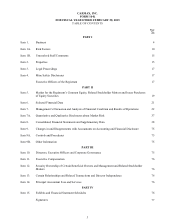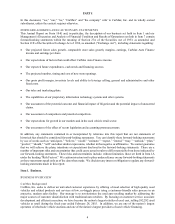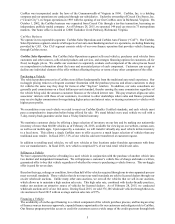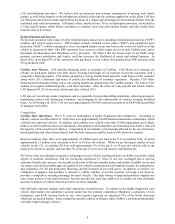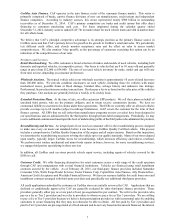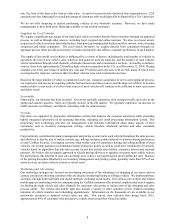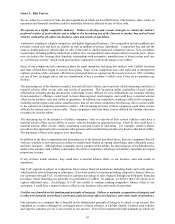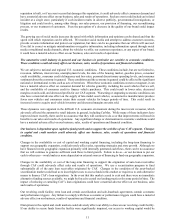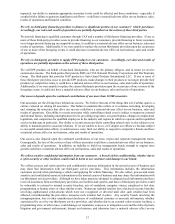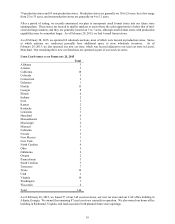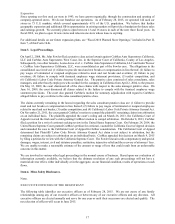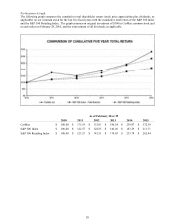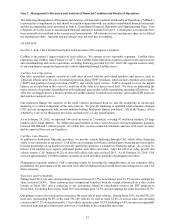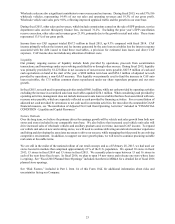CarMax 2015 Annual Report Download - page 17
Download and view the complete annual report
Please find page 17 of the 2015 CarMax annual report below. You can navigate through the pages in the report by either clicking on the pages listed below, or by using the keyword search tool below to find specific information within the annual report.13
business, sales and results of operations. In addition, our failure to respond quickly and appropriately to such a security
breach could exacerbate the consequences of the breach.
Our business is sensitive to changes in the prices of new and used vehicles.
Any significant changes in retail prices for new and used vehicles could have a material adverse effect on our sales
and results of operations. For example, if retail prices for used vehicles rise relative to retail prices for new vehicles,
it could make buying a new vehicle more attractive to our customers than buying a used vehicle, which could have a
material adverse effect on sales and results of operations and could result in decreased used margins. Manufacturer
incentives could contribute to narrowing this price gap. In addition, any significant changes in wholesale prices for
used vehicles could have a material adverse effect on our results of operations by reducing wholesale margins.
Our business is dependent upon access to vehicle inventory. Obstacles to acquiring inventory—whether because
of supply, competition, or other factors—or a failure to expeditiously liquidate that inventory could have a material
adverse effect on our business, sales and results of operations.
A reduction in the availability of or access to sources of inventory could have a material adverse effect on our business,
sales and results of operations. Although the supply of late-model used vehicles appears to be increasing recently,
there can be no assurance that this trend will continue or that it will benefit CarMax.
We source a significant percentage of our vehicles though our appraisal process and these vehicles are generally more
profitable for CarMax. Accordingly, if we fail to adjust appraisal offers to stay in line with broader market trade-in
offer trends, or fail to recognize those trends, it could adversely affect our ability to acquire inventory. It could also
force us to purchase a greater percentage of our inventory from third-party auctions, which is generally less profitable
for CarMax. Our ability to source vehicles through our appraisal process could also be affected by competition, both
from new and used car dealers directly and through third-party websites driving appraisal traffic to those dealers. See
the risk factor above titled “We operate in a highly competitive industry” for discussion of this risk. Our ability to
source vehicles from third-party auctions could be affected by an increase in the number of closed auctions that are
open only to new car dealers who have franchise relationships with automotive manufacturers.
Used vehicle inventory is subject to depreciation risk. Accordingly, if we develop excess inventory, the inability to
liquidate such inventory at prices that allow us to meet margin targets or to recover our costs could have a material
adverse effect on our results of operations.
We operate in a highly regulated industry and are subject to a wide range of federal, state and local laws and
regulations. Changes in these laws and regulations, or our failure to comply, could have a material adverse effect
on our business, sales, results of operations and financial condition.
We are subject to a wide range of federal, state and local laws and regulations. Our sale of used vehicles is subject to
state and local licensing requirements, federal and state laws regulating vehicle advertising, and state laws regulating
vehicle sales and service. Our provision of vehicle financing is subject to federal and state laws regulating the
provision of consumer finance. Our facilities and business operations are subject to laws and regulations relating to
environmental protection and health and safety. In addition to these laws and regulations that apply specifically to
our business, we are also subject to laws and regulations affecting public companies and large employers generally,
including federal employment practices, securities and tax laws. For additional discussion of these laws and
regulations, see the section of this Form 10-K titled “Laws and Regulations.”
The violation of any of these laws or regulations could result in administrative, civil or criminal penalties or in a cease-
and-desist order against our business operations, any of which could damage our reputation and have a material
adverse effect on our business, sales and results of operations. We have incurred and will continue to incur capital
and operating expenses and other costs to comply with these laws and regulations.
Recent federal legislative and regulatory initiatives and reforms may result in an increase in expenses or a decrease in
revenues, which could have a material adverse effect on our results of operations. For example, the Dodd-Frank Wall
Street Reform and Consumer Protection Act of 2010 (the “Dodd-Frank Act”) regulates, among other things, the
provision of consumer financing. The Dodd-Frank Act established a new federal agency, the Consumer Financial
Protection Bureau (“CFPB”), with broad regulatory powers over consumer financial products and activities. In
September 2014, the CFPB proposed to extend its supervisory authority to large nonbank auto finance companies,
including CarMax. We expect that the CFPB will seek to conduct supervisory examinations of nonbank auto finance
companies like CarMax to ensure compliance with various federal consumer protection laws. The evolving regulatory


